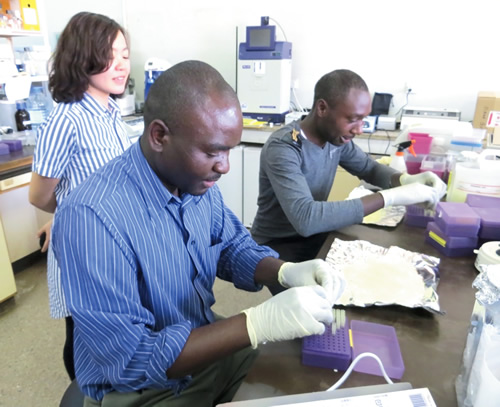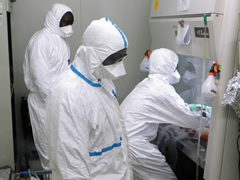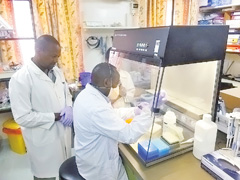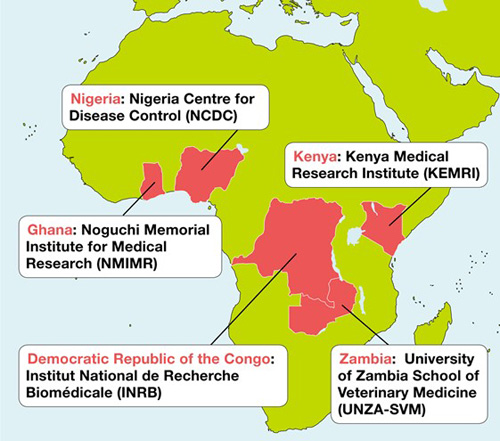For many years, both Nagasaki University and Hokkaido University have been cooperating with developing nations in the field of infectious disease control. Systems and personnel rooted in these countries further broaden the options for cooperation and assistance.

Working in the School of Veterinary Medicine, University of Zambia.
Communicating Over Many Years
JICA has long been engaged in infectious disease control with Japanese universities. Partner institutions around the world include: the Kenya Medical Research Institute, the School of Veterinary Medicine at the University of Zambia, the Noguchi Memorial Institute for Medical Research in Ghana in Africa, and the National Institute of Hygiene and Epidemiology in Vietnam in Asia.
One prominent example is mSOS [1] , an information system used in the Kenyan Ministry of Health. Developed in a joint project with Nagasaki University, this system can survey and monitor the outbreak of infectious diseases using mobile phones. In addition, in the field of research and development, results from research conducted with Hokkaido University in Zambia led to the development of a rapid diagnosis kit that is effective in preventing the spread of the Ebola virus.

Working in the BSL [2] 3 laboratory in Zambia.
Both universities are also putting efforts into the development of human resources. In Nagasaki University's Program for Nurturing Global Leaders in Tropical and Emerging Communicable Diseases, local physicians and researchers learn Japanese techniques related to infectious diseases, allowing them to demonstrate leadership in the field after returning to their own country. Since 2017, Hokkaido University has been running the Zoonosis Control Expert Certification Program at its Graduate School of Infectious Diseases. The program trains specialists in infectious diseases that affect both humans and animals. In addition, from 2018, a "Global Zoonosis Control Expert Training Course" was launched for graduates of the course, as well as researchers, government officials, and others with the requisite level of knowledge and skills.
Effective Responds to Emergencies
Achievements accumulated over time are helping in the battle against COVID-19, which is currently causing havoc around the world.
"Four people in Zambia who studied at our university are now playing key roles in combating COVID-19," says Dr. Kajihara Masahiro of the Hokkaido University Research Center for Zoonosis Control. At the request of the University of Zambia, the Center has introduced locally the COVID-19 detection methods used in Japan. There are also strong bonds with members at the Zambia base. This laboratory has improved significantly over more than thirty years of joint research. As a result, even under these trying circumstances, it can match the level of inspections found in Japan.

Provision of COVID-19 test reagents to Kenya Medical Research Institute (KEMRI) and training in real time RT-PCR (test method) for KEMRI staff at the University of Nagasaki's Kenya base.
"We are looking for more effective testing methods tailored to local conditions," says Dr. Morita Koichi, the Institute of Tropical Medicine at Nagasaki University. The university's research has led to the development of a rapid detection method of COVID-19, which is simpler and can produce results in about ten minutes. The university is now considering expanding the method beyond Japan. The test equipment consumes little electricity and runs on batteries. This is particularly important in developing countries, where there is unreliable transportation infrastructure, frequent power outages, and long periods of time for patients and specimens to be transported to urban laboratories.
According to Dr. Sawa Hirofumi, Director of the Zambian Research Center for Zoonosis Control and Infectious Diseases, countermeasures against the COVID-19 have been made possible by the continuous cooperation which has taken root in the local community, rather than just temporary assistance. He addressed these rooted factors, noting that developing countries have personnel with highly specialized knowledge and skills, they have facilities equipped to handle highly infectious and dangerous pathogens, and Japan has a good understanding of the situation in the recipient country.
A relationship based on trust with the locals, established through long years of cooperation and assistance is also an asset for Japan. Universities and research institutions in Japan use specimens and information obtained from overseas research sites. In addition, there is a synergistic effect of strengthening and enhancing the foundation of infectious disease research in Japan by utilizing these research results and research networks.
Labs in Africa Combating Infectious Diseases
As part of its countermeasures against infectious diseases in Africa, JICA has been cooperating with centers in each region of Africa through a combination of grant aid to develop facilities, and technical cooperation in human resource development and research. Equipped with advanced and safe laboratories, and highly skilled personnel, these centers have grown into a leading force for infectious disease control in the region.
| Nigeria | Nigeria Centre for Disease Control (NCDC) |
|---|---|
| Kenya | Kenya Medical Research Institute (KEMRI) |
| Ghana | Noguchi Memorial Institute for Medical Research (NMIMR) |
| Democratic Republic of the Congo | Institut National de Recherche Biomédicale (INRB) |
| Zambia | University of Zambia School of Veterinary Medicine (UNZA-SVM) |

Notes
- [1]mobile SMS-based disease outbreak alert system
- [2]BSL: Short for Bio Safety Level. Rankings given to facilities that handle things like microorganisms and pathogen. Ranges from Level 1 to Level 4. The higher the number, the more risky pathogens it can handle.




scroll